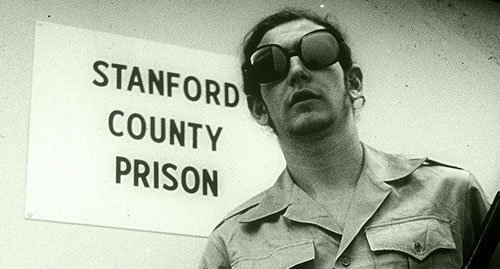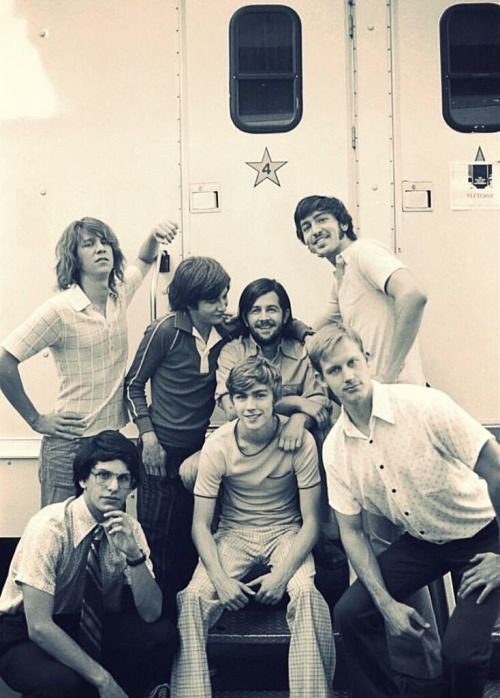#stanford prison experiment
Text
remember when game changer changed normally? we used to be making a noise and toys and talking to people on the street. we have progressed to psychological torture.
lord of flies was right I think- *gets shot*
#I should preface#I have never read lord of the flies#nor know much about it#dropout#game changer#stanford prison experiment
83 notes
·
View notes
Text
Recent research found the cruelty of Zimbardo’s prison guards didn’t emerge spontaneously; some behaviour was encouraged. Some of the “prisoners” later admitted that they were pretending to be distressed.
Similarly, a study published in 2007 found that the 1964 incident that inspired the theory of the bystander effect was distorted. According to the paper, archive material shows far fewer people witnessed the incident than was reported at the time, and some people could only hear screams, without seeing the location of the incident. At least one person did try to intervene.
Recent research indicates that bystanders are much more likely to intervene than the theory suggests. A 2019 study of 219 violent situations from cities around the world caught on CCTV showed that bystanders – not just one, usually several – intervened to help victims 90% of the time.
The study also found that the more people were present, the more likely passers-by were to intervene. In the words of the study’s lead researcher, Richard Philpot: “It shows that people have a natural inclination to help when they see someone in need.”
The burgeoning field of “heroism studies” also questions the bystander effect. In a recent article for The Conversation, I described how acts of heroic altruism are common during terrorist attacks, when people often risk their own lives to help others.
Consider the following situation: you’re standing on a train platform. The person next to you suddenly faints and falls on to the track, unconscious. In the distance, you can see a train approaching. What would you do?
You might doubt whether you would act heroically. But don’t underestimate yourself. There is a strong possibility that, before you knew it, you would find yourself on down on the track, helping the person to safety. There is a growing awareness amongst researchers that heroism is natural and spontaneous, and by no means exceptional.
#psychology#altruism#Heroism Studies#bystander effect#Stanford prison experiment#Kitty Genovese#Philip Zimbardo
372 notes
·
View notes
Text

The Stanford prison experiment was a human experiment to psychologically study the human responses to captivity. Half the subjects had to play the role of inmates, and the other half prison guards, living in a prison environment. The experiment was conducted by Philip Zimbardo of Stanford University in 1971.
The inmates and prison guards adapted to their roles and even stepped beyond the boundaries of what had been predicted, which lead to psychologically damaging and dangerous situations. One-third of the prison guards were judged to have exhibited “genuine” sadistic tendencies, while many prisoners were emotionally traumatized and two had to be removed from the experiment early.
Finally, Zimbardo, alarmed at the increasing abuse and anti-social behaviour, terminated the experiment earlier than intended.
70 notes
·
View notes
Text
#yk. since we're cutting out the middle man and doing psych experiments on ourselves soooo#stanford prison experiment#polls
67 notes
·
View notes
Text
POV i’m your sociology teacher and i’m making you watch Succession S2 E3 “Hunting” instead of the usual go-to, The Stanford Prison Experiment (2015)
277 notes
·
View notes
Text
this is the article in which the participants and organiser of the stanford prison experiment are interviewed and say 'yeah it was all fake'. in case you ever have to fight for your fucking life on this stupid topic like i keep having to. you have to sign up but you dont have to pay.
5 notes
·
View notes
Text
i mean well while im here i have some Oblivious Traumatized Victim things to say such as. if you related heavily to the prisoners in the stanford prison experiment movie in near every way because it was like a slightly less unhinged version of your entire childhood up to age 18, would it be a good idea to consider that you might have been subjected to tbmc/torture. be honest--
#when i say my childhood was if that movie was made as an indie horror film#i mean it wholeheartedly#i'm trying to research it more but i am confused bc idk what parenting is supposed to be#if not prioritizing obedience over all else and using basic needs to get it#which is probably not a good sign#what do you mean some parents are like that unintentionally and without planning#did#osdd#pdid#tw tbmc#tbmc#stanford prison experiment#handmadeorganicpost
10 notes
·
View notes
Text
I think we should recreate the stanford prison experiment but with discord moderators
32 notes
·
View notes
Text
Listening to my 27 year old white male friend talk about what he'd do if x thing happened while he was a prison guard makes me suddenly understand the Stanford Prison Experiment.
#i dont understand the lack of empathy#even towards a fictional person#theres just nothing#but fantasies of violence#and i know this guy is all talk#ive seen him do actual pub security and he doesnt act like that#but its still so uncomfortable#stanford prison experiment#thatscrazyrandom
2 notes
·
View notes
Text



Photos from Stanford Prison Experiment days
(Since y'all seem to like it, i added one with a different filter)
#miles heizer#stanford prison experiment#marshall lovett#michael angarano#nicholas braun#thomas mann#actor#chris sheffield#tye sheridan#actors#matt bennett#the good ol' days#2015#serving the retro aesthetic#vintage
98 notes
·
View notes
Text
The one video we watched in my psychology class be like:
“Did you know that 65% of Americans would shock a person to death because a person in a lab coat told them to? Anyway, back to 24 college students in a basement.”
#psychology#the milgram experiment#stanford prison experiment#stanley milgram#Philip zimbardo#ethics#I can and will be reblogging this and going on a rant about both of these experiments with the extent that my knowledge provides
26 notes
·
View notes
Text
i have made a discord server that
has a secret word
if you guess the secret word you get the right to post in the exclusive channel
if you get it wrong you get kicked
everyone can see the secret channel but until you guess the word you can only emoji react in it
the secret word resets daily and everyone loses their access and has to find it again
It has resulted in people in the secret channel watching people desperately trying to guess and cheering them on/mocking them, as the frantic applicants emoji react the word "BITCH" to them
anyway come hang out https://discord.gg/mY3NpeQWZE
#discord#crabs in a bucket#social experiment#stanford prison experiment#i may be the worst person alive
12 notes
·
View notes
Text

Template if you want it

Also for those who don't know, the Stanford Prison Experiment by Zimbardo about conformity to roles and authority. It's pretty intriguing but I should warn you that it gets disturbing fast (seriously, the 'guards' did some horrendous stuff to the 'prisoners') so I'd steer clear if you're triggered by abusive behaviour.
#undertale#flowey#deep rock galactic#the cuphead show#claptrap#stanford prison experiment#psychology#tw for deeply unethical behaviour from both participants and the researcher
20 notes
·
View notes
Text
Welcome to my blog
My name is Philip Zimbardo, I was born on the 23rd of March 1933 (90 years young) in New York City.
I studied at Brooklyn College and Yale University, completing my PhD in Psychology in 1959. Started working as a professor of psychology in Stanford University.
You might know me for the Stanford Prison experiment (1971) to study what would happen when one group is granted authority over another...yeah I know it didn't go down too well but if you're here to question the ethics of my experiment DNI (do not interact)!!!
I also developed the Shyness Clinic in Stanford to help people overcome shyness in social settings, I worked there for a while as a research consultant #hardworking.
I also wrote some books, here are some selected works:
The Cognitive Control of Motivation (1969)
Influencing Attitudes and Changing Behavior (with E. Ebbesen, 1969)
Shyness: What It Is, What To Do About It (1977)
The Lucifer Effect: Understanding How Good People Turn Evil (2007)
The Time Paradox: The New Psychology of Time That Will Change Your Life (with J. Boyd, 2008)
The Demise of Guys: Why Boys Are Struggling and What We Can Do about It (2012)
Here are some awards I have earned:
- American Psychological Foundation Gold Medal for Lifetime Achievement in the Science of Psychology.
-Ig Nobel Award for Psychology
- Wilbur Cross Medal
-Carl Sagan Award for Public Appreciation of Science
-The VIZE 97 Prize
I founded the Heroic Imagination Project, which promotes everyday heroism and help prevent people from being coerced to the dark side of human nature.
You should also watch my PBS show "Discovering Psychology" if you have read this far, you are clearly interested in what I have to say. I also did a TED Talk on the "Psychology of Evil" Check it out!!
Do Not Follow me if:
-You want to question the ethics of some of my discoveries.
-You are not interested in psychology.
Follow my wifey @Christina Maslach 💍
Thank you for reading!
#psychology#philip zimbardo#stanford university#stanford prison experiment#psychology of evil#shyness clinic#heroic imagination project
1 note
·
View note
Text

3 notes
·
View notes
Note
how long have you been here?
I do not know!!!!!!!!
It's very frustrating.
But there are many blog posts published and a general wasting about me, so carrying the one my calculations suggest the answer is too long.
#economics#economy#prisoner#the prisoner experiment#prisoner experiment#stanford prison experiment#prison#prison experiment#dungeon#dungeon life#time#temporal#watch#clock#the days pass me by#wasting#bodily decline
2 notes
·
View notes